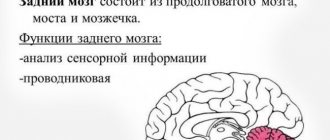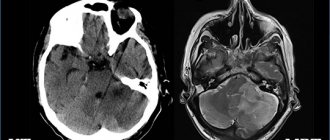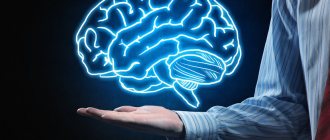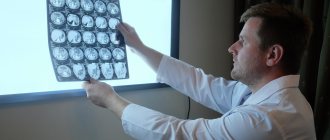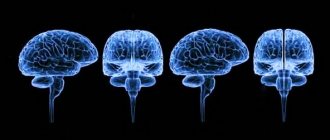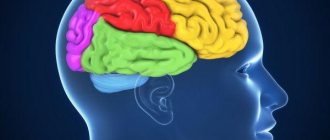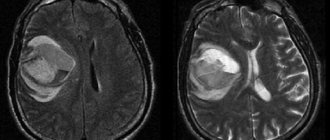Any act or action of a person is preceded by mental activity, during which the choice of one single solution from many options occurs.
The prefrontal cortex (PC) is responsible for this process in the brain, which, based on accumulated life experience, determines the reaction to a particular situation.
It is this area that is the basis for building personality, therefore its development and preservation in a normal state is important for every person.
General information
The prefrontal cortex is one of the parts of the frontal lobes of the brain, with the help of which any action performed by a person is controlled, controlled and focused.
In addition, this area allows the individual to effectively distribute his time, and also influences the social behavioral line in society. PC includes 6 (9, 10, 11, 12, 46, 47) Broadmon fields. It is located directly behind the frontal bone and is the anterior third of the cerebral cortex.
Psychiatrist Thomas Galtieri characterized this zone as a tool that allows a person to set a goal, develop a plan for its implementation and achieve it even in the presence of obstacles, by making timely changes to the developed line of behavior. He believed that the presence of a well-developed and normally functioning PC is the main factor in the effectiveness of an individual.
Stereognosis, stereognosis
Complex types of sensitivity are localized in the cerebral cortex at the level of the superior parietal lobule, where there is no somatotopy. Complex types of sensitivity include stereognostic sensitivity (stereognosis, stereognosis), two-dimensional spatial sensitivity, a sense of localization and discrimination. The visual projection zone (visual cortex) occupies the area of the calcarine sulcus - the inner surface of the occipital lobe. The auditory projection zone (auditory cortex) occupies the center of the superior temporal gyrus and Heschl's gyrus. The vestibular projection zone is located next to the auditory zone. The olfactory projection zone is localized on the inner surface of the temporal lobe, in the gyrus of the hippocampus. The gustatory projection zone is located next to the latter, as well as in the area of the tire and the Reili island.
PC structure
The structure is based on three areas of the frontal lobe - dorsolateral, medial and orbitofrontal.
The dorsolateral region controls the expression of emotions in a specific situation through its connection with the limbic system. In addition, this area of the cerebral cortex influences a person’s attention.
The medial region is responsible for recording information into short-term memory and allows you to compare data received by the senses and stored in the brain. Also, this part of the cortex allows you to transfer information from short-term memory to its permanent storage location.
The orbitofrontal region helps to use accumulated experience when making decisions.
How to tip the scales in the right direction
When I planned this chapter, I decided to make it longer than the others to maximize activation of your prefrontal cortex. When you read these words, your prefrontal cortex is active, extracting the meaning behind the words and making connections to what you read earlier. Activating the prefrontal cortex is exactly what you need to overcome the limbic system and focus your attention on things that bring maximum impact.[…]
Even after you identify the most important tasks for yourself and form a strong intention to tackle them, there is still a high chance that you will procrastinate and procrastinate before actually taking them on. This will be true even if you have a stronger prefrontal cortex than most of us.
Luckily, there are several strategies that can work wonders to turn the situation around in your favor. Spending some time planning can make even the most boring tasks like filing your taxes as fun as watching the new season of House of Cards.
Functions
The PC is one of the most developed areas of the brain, which performs a large number of functions. The main ones are:
- Concentration of attention, allowing a person to focus on isolating only the necessary information, ignoring extraneous sensations and thoughts. This is due to the ability to send impulses to the sensory and limbic areas of the brain, which reduce distracting signals. Concentration is very important when studying and having to work for a long time on the same project.
- Perseverance in achieving set goals and objectives, which allows you to continue to strive for the intended result, despite difficulties and force majeure circumstances.
- Assessment of the current situation. In this case, all factors influencing the ongoing event are taken into account, and not just a limited set. This PC function allows a person to comprehensively consider problems, which greatly facilitates the search for solutions.
- Critical thinking, which allows you to develop the necessary set of actions to find reliable and verified information. In other words, a person must ensure that the data is correct before using it.
- Planning allows you to develop specific measures and actions to achieve the intended goal. This PC function significantly reduces the number of uncertain factors and force majeure circumstances when performing the assigned task.
- Forecasting events, which allows planning to take into account even those factors and circumstances that may arise in the future.
- Using accumulated experience. Thanks to this function, a person will take into account mistakes made in the past and if similar situations arise, he will choose the option that will prevent a repetition of the unfavorable outcome.
When considering functions, special attention must be paid to its management of human emotions. In the PC, the perception and translation of processes occurring in the simpler limbic system into certain feelings and emotions (love, hatred, joy, grief, desire, etc.) occurs.
The prefrontal cortex is also responsible for empathy, which allows you to determine the feelings and mood of another person by the emotions they express.
In addition, the PC constantly monitors the limbic system for strong emotional outbursts and extinguishes them when they occupy a dominant role. This helps a person to react to events happening around him not impulsively, but only after careful analysis and selection of the best solution, which will take into account possible future consequences.
Parietal lobe
Another structural change often observed in experienced meditators is shifts in the level of activity in the parietal lobe. The parietal lobe helps mediate the feeling component of relationships between self and others. It also mediates the sense of orientation in space and what position our body occupies in space. When we engage in activities such as interacting with others or performing spatial cognitive tasks—which by definition involve experiencing and interacting with space—there is activity in the parietal lobes of both sides of the brain. .
Beyond Meditation
We also find that experienced meditators who have practiced for many years, even when they are not directly practicing, have higher activity in the parietal lobes. One interpretation of this phenomenon is that this increased activity suggests that the deep states achieved in meditation strengthen our relationships with the world and our relationship with the spiritual dimensions of life. So even when we are not directly meditating, we still experience a feeling of deep interconnection - with the world around us and with that part of ourselves that eludes any definitions and transcends the world of form. This identification is intangible, but is experienced as something very, very real. The more grounded we become in our sense of interconnectedness, the more of this unique activity is registered in the parietal lobes.
Increased activity in the parietal lobe is evidence that deep meditative states strengthen our connection with the world and the spiritual dimensions of life
Another correlation associated with increased activity in the parietal lobes is increased awareness—conscious awareness, alertness
) and the ability to resonate with the thoughts and feelings of others.
During meditation
Interestingly, when experienced meditators practice a very deep meditative state - when there is a sense of unity and non-dual consciousness, where the dualism of subject and object collapses and the sense of being separate from others dissolves - this corresponds to decreased activity in the parietal lobes. This all-pervading inner experience is an experience of endlessly expanding space, sometimes including the complete dissolution of bodily awareness.
So again, we see that long-term and advanced practice can help the brain maintain increasingly higher levels of connectedness with the world, which often leads to greater degrees of social awareness, inner freedom and fulfillment in life.
To be continued…
Symptoms of dysfunction
Disruption in this area is accompanied by the following symptoms:
- Absent-mindedness, in which a person cannot concentrate on obtaining the necessary information. This happens due to the fact that incoming data is not stored in short-term memory due to it being overwritten by newly arrived data.
- Incorrect or incomplete assessment of the situation. In this case, the information is either distorted or received incompletely, since multiple signals arrive from the sensory area at the same time, which overlap each other, as a result of which the PC either perceives the strongest data, or they are all missed.
- Impulsivity, in which a person does actions without first thinking and analyzing their consequences.
- Lack of critical thinking. This symptom is manifested by the fact that a person takes any information on faith and does not double-check it.
- Performing any action without planning. In this case, a person goes towards his intended goal with a large number of unexpected difficulties that could have been avoided.
- Making the same mistakes when a decision is made without reference to accumulated experience, but only on desires.
- A complete or partial lack of emotionality, due to the fact that the prefrontal cortex is unable to process and display received signals from the limbic system.
- Hyperactivity, which manifests itself in the inability to concentrate on a specific task and violent expression of emotions.
If at least one of the above symptoms occurs, a person needs to see a doctor for a brain examination. The functioning of the cortex is tested using the SPECT technique, which is based on comparing the activity of a given area of the brain in a state of rest and stimulation. In case of pathologies in the stimulated mode, activity will either remain in place or decline.
Some of the main reasons for the appearance of pathologies in the brain are hemorrhage in the brain due to a head injury or extensive stroke and intoxication of the body with harmful substances (alcohol, poisons, toxins, etc.). There are also frequent cases of PC deviation due to genetic and viral diseases that affect the central nervous system (CNS). In addition, the performance of PC functions can be affected by prolonged stress and lack of sleep.
We should not forget the fact that the cortex ceases to perform its functions partially or completely as a person ages. This is caused by a severe reduction in neurons in this area of the brain.
Reflection and reconnection
After the pancake episode, my daughter and I reconnected while we were rollerblading and talking. I apologized to her for losing my temper. Now all I had to do was establish a connection with my son.
When we are uncontrollably angry, we cannot expect our interlocutor to say: “Tell me more about the reasons for the anger.” Anger breeds anger, and before you try to fix the situation, you need to cool down. Even a short break turns out to be very effective. If you value your relationship, it is important to take the initiative and take the first step towards reconciliation with the other person.
This especially applies to parents. We parents are supposed to be wiser, kinder and more mature, and even if we admit to ourselves that this is not always the case, at least we need to strive for this goal. In addition, learning not to berate yourself for too long helps overcome shame and guilt. Having a kind attitude towards yourself helps you take the necessary steps to correct the situation and restore communication. It also helps prepare oneself mentally for the potential pushback that often occurs when we come to terms. Without this preparation, we may end up feeling upset again, thereby increasing the misunderstanding that we are trying to overcome.
Before we connect with others, we need to make sure we reconnect with ourselves. To do this, I needed to remind myself of the most important component of mental activity - the ability to analyze feelings and thoughts. In the hustle and bustle of everyday life, we often forget that sometimes it is important to focus on the inner life of consciousness.
As I analyzed the pancake episode, I asked myself: What physical sensations and emotions did I experience? What images were before my eyes? What were your thoughts then and what are your thoughts now? In a state of nervous breakdown, I acutely felt tension in my body and a rapid heartbeat, I had a picture of children quarreling before my eyes, I felt anger and irritation, and my thoughts revolved around how my son should have behaved. Now I could look at all this from afar, with the openness, objectivity and observation lost at that moment. I was able to look at the deeper issues that triggered my breakdown.
Again, I could keep beating myself up and repeating, “What’s wrong with you, Dan? You studied this for many years, wrote several books... Why can’t you control yourself?” However, reflection requires being attuned to your own wavelength, which gives support and kindness, and does not condemn or humiliate. Reflection is a mental state based on empathy. Self-deprecation will not help you find a way out of a difficult situation and control your negative emotions in the future.
The fact that I found myself in the grip of anger and irritation that day was the result of a temporary shutdown of my medial prefrontal cortex: it lost almost nine of its functions. My brain lost balance and coordination. The lower limbic lobe, brainstem and body gained control of the situation, taking advantage of the fact that the cortex, which usually shows empathy, flexibility and prudence, was switched off. As soon as I began to cool down, the integrative function began to recover.
After understanding the development of events that provoked and fueled my anger, I analyzed my consciousness and felt the moment when my brain was sufficiently integrated to conduct a dialogue with my son.
As my prefrontal cortex came back into play, my empathy came back into play, and I focused on rebuilding the broken connection with my son.
Preventing problems
There are a number of measures that can not only prevent disorders of the prefrontal cortex, but also enhance its performance. For this purpose, specialized medications are used that activate the work of the central nervous system and brain (glycine, undevit, aminalon, bilobil, Brain Rush, etc.).
In addition, the good condition of the body as a whole has a positive effect on the functioning of this zone. To maintain it, it is necessary to: limit or completely abstain from drinking alcoholic beverages, follow a fruit and vegetable diet, and also engage in physical exercise daily. It is also recommended to use meditative practices that help relax the central nervous system and help activate the prefrontal cortex.
If the cause of problems is stress, age or sleep, then a visit to psychologists may be prescribed to undergo specialized training that is aimed at developing the functions performed by the prefrontal cortex.
An example would be exercises that help you plan your day wisely, set and step-by-step fulfill life goals, and control your behavior in stressful situations.
